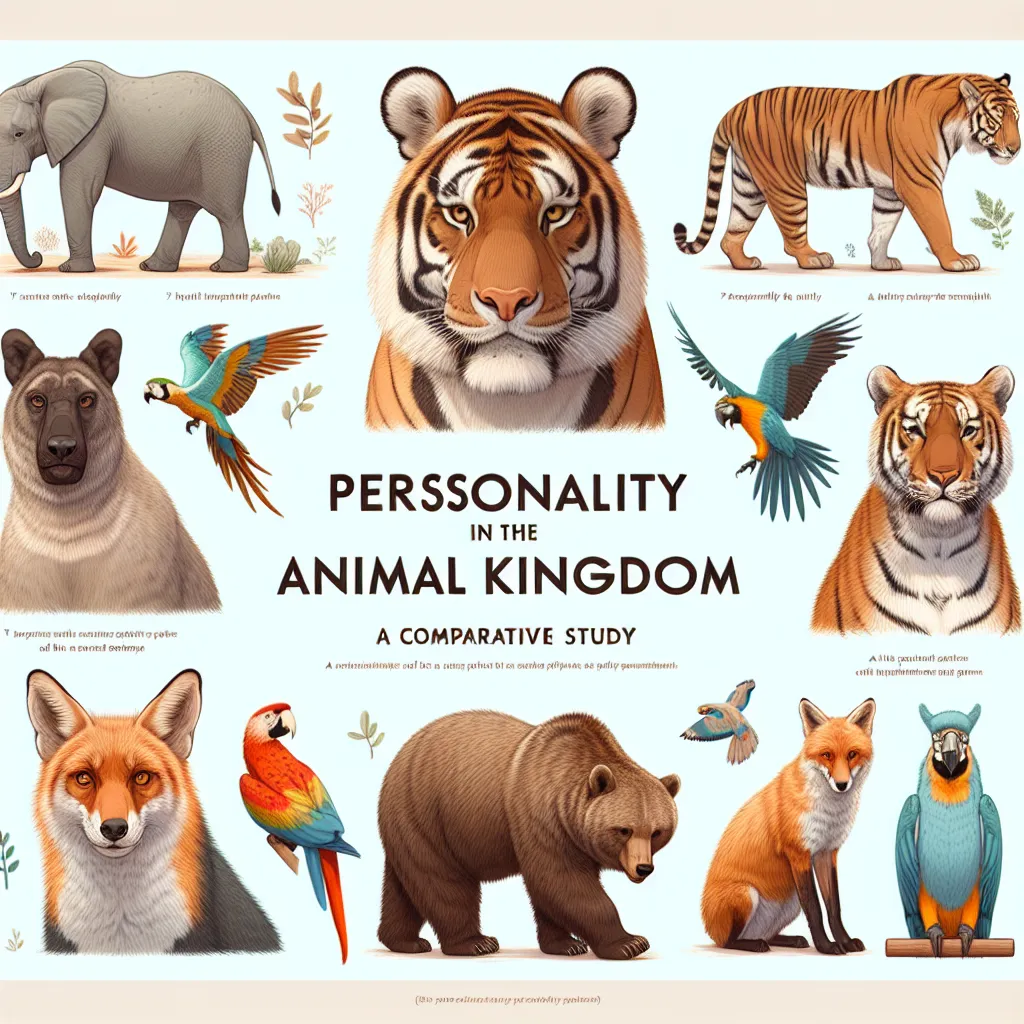Personality in the Animal Kingdom: A Comparative Study
The animal kingdom is a diverse tapestry of behaviors, adaptations, and interactions. Among the many facets of animal behavior research, personality has emerged as a significant and compelling area of study. Personality in animals, often characterized by consistent behavior patterns across time and context, is not a mere projection of human traits onto other species. Instead, it reflects evolutionarily adaptive strategies that potentially enhance survival and reproductive success. This comparative study embarks on an exploration of personality within various species, illustrating the complexity and universality of this phenomenon in the animal kingdom.
Long considered an exclusively human concept, personality has now been identified in a myriad of animal species. Each species exhibits unique personality traits that have evolved in response to the ecological niches they inhabit. From the bold exploration tendencies of certain bird species to the shy or aggressive temperaments of individual fish, personality can profoundly influence the way animals interact with their environment and each other.
Aquatic Personalities: Divergence in Fish and Cephalopods
In the depths of the oceans, personalities are not confined to the charismatic mammals often showcased in documentaries. Even among fish, individual differences in boldness, sociability and aggression have been documented. Studies observing shoaling fish reveal that while some individuals consistently take the lead and are more explorative, others are more cautious and reactive to threats. The personality of these fish affects group dynamics, predator avoidance strategies, and the ability to find resources.
Cephalopods such as octopuses, cuttlefish, and squids also display distinct personalities. Researchers have found variation in cephalopod behavior related to their reaction to novel objects, propensity to explore, and even how they handle stress. These invertebrates, with their complex nervous systems, challenge the notion that personality is linked to higher cognitive processes found in vertebrates.
Feathered Personalities: Bird Behavior and Individuality
Avian species provide a fascinating window into the world of animal personality due in part to their high visibility and the diversity of behaviors they demonstrate. For instance, in species where some birds engage in longer migrations than others, those differences often correlate with their boldness in feeding and risk-taking. Similarly, within flock dynamics, certain individuals may repeatedly serve as sentinels, watching for threats while others feed, displaying consistent vigilance traits.
Recent research into crow intelligence has highlighted how individual birds can display problem-solving skills, tool use, and even recognition of human faces. These studies suggest that crows possess individual ‘personalities’ that may give them an edge when it comes to interactions with their complex social and physical environments.
Terrestrial Characters: Mammalian Diversity
Among terrestrial mammals, personality research has extended to a broad swath of species ranging from rodents to primates. Laboratory studies on rats and mice commonly recognize individual differences in curiosity, anxiety, and aggression, which can have direct consequences for their ability to navigate mazes or solve problems.
Meanwhile, studies of our closest relatives, non-human primates, have shed light on social personalities where traits like dominance, sociability, and openness can dictate an individual’s role in social hierarchies and mating success. From the solitary orangutans to the highly social chimpanzees, each species displays a range of personality types that facilitate survival in their particular social systems.
Cultural Influences and Personality Transmission
In species with complex social structures, such as elephants, dolphins, and certain primates, culture can shape personality. Learned behaviors passed down through generations can influence individual behaviors, thereby affecting the personalities observed in different populations.
These traditions can involve foraging techniques, vocalizations, or social interactions, which are all imbued with the personality characteristics of those teaching and learning these behaviors. For instance, if an innovative member of a pod of dolphins discovers a new foraging method that becomes part of the group’s culture, the personality trait of innovativeness can proliferate and shape the overall culture.
Impact of Personality on Survival and Reproduction
The implications of animal personality go beyond mere academic curiosity. Understanding individual variation within a species is instrumental in conservation efforts, captive breeding programs, and managing human-wildlife interactions. Personalities can significantly affect an animal’s likelihood of getting caught in traps or engaging with bait, which can translate into survival biases that influence population dynamics.
In terms of reproduction, animals with specific personality traits may be more or less successful in finding mates and rearing offspring. For example, bolder individuals might secure more resources or mates but also may be more prone to predation. Understanding these trade-offs is crucial in comprehending the evolutionary persistence of personality differences.
Methodological Challenges and Advancements
The study of personality in animals is not without its challenges. One of the main difficulties is ensuring that observed behaviors are consistent over time and in different situations—key criteria in defining personality. Advances in technology and methodology, such as automated tracking of animals in naturalistic settings, have made it possible to gather large datasets that can be used to analyse personality with greater precision.
Moreover, interdisciplinary approaches that blend ethology, ecology, genetics, and psychology are paving the way for more comprehensive understandings of personality in the animal kingdom. Through these collaborative efforts, scientists are beginning to decipher the genetic underpinnings of personality traits and how they might be inherited.
Personality as an Evolutionary Adaptation
The prevalence of personality across the animal kingdom suggests its value as an evolutionary adaptation. Diverse personalities can be advantageous to a group by providing a mix of behaviors that can handle different environmental challenges. For example, having both bold and cautious individuals can balance the pursuit of new resources with the mitigation of potential risks. This diversity can increase the resilience of a population to changes in the environment.
Conclusion
Personality in the animal kingdom is a vibrant field of study, highlighting the intricate tapestry of behaviors that constitute the lifeways of various species. From fish to birds to mammals, personality traits play a pivotal role in survival, social interactions, and reproduction. Comparative studies into this realm not only expand our understanding of the animal world but also raise profound questions about the origins and functions of personality itself.
As scientists continue to unravel the complexities of personality, we stand to gain deeper insights into the adaptiveness of behavior, the interplay between genetics and environment, and the evolutionary forces that shape the lives of animals in their natural habitats. The study of personality in non-human animals enriches our perspective on the breadth of life’s adaptability and provides a mirror through which we can reflect on our own species’ place in the animal kingdom.



Leave a Comment